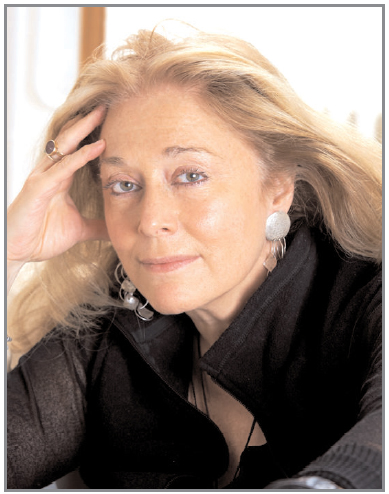One Art
BY PROF. VAROL AKMAN
Jorie Graham
"Working on a poem can be like kneading dough; you don't know when you've overworked it, but you know a poem is finished when it's not moving anymore."
 Jorie Graham was born in New York City in 1950. Her father was a journalist and her mother a sculptor. She spent her childhood in Rome and attended the first Montessori School and then the Lycée Chateaubriand. She studied at the Sorbonne during the student uprising of 1968. At the Nanterre Campus, where she was majoring in sociology with Henri Lefebvre, Daniel Cohn-Bendit was a classmate. She subsequently attended NYU, where she studied film with Haig Manoogian and Martin Scorsese and received her B.F.A. in 1974.
Jorie Graham was born in New York City in 1950. Her father was a journalist and her mother a sculptor. She spent her childhood in Rome and attended the first Montessori School and then the Lycée Chateaubriand. She studied at the Sorbonne during the student uprising of 1968. At the Nanterre Campus, where she was majoring in sociology with Henri Lefebvre, Daniel Cohn-Bendit was a classmate. She subsequently attended NYU, where she studied film with Haig Manoogian and Martin Scorsese and received her B.F.A. in 1974.
English was Graham's third language after Italian and French. In fact, she spoke broken English when she returned to the U.S. in 1969. In a 1996 interview with Timothy Cahill of The Christian Science Monitor, Graham explains how she became seriously interested in poetry: "I got lost one day in the corridors at NYU, and heard the words, 'I have heard the mermaids singing, each to each. I do not think that they will sing to me' floating out of a doorway. I was so taken that I went into the classroom for a minute and sank into a seat in the back row. It was M. L. Rosenthal reading Prufrock. I sat there for the whole semester." She later received an M.F.A. in poetry (1978) from the University of Iowa Writers' Workshop. She had a long teaching career there (1983-1998) and is currently the Boylston Chair at Harvard University, a position held formerly by Seamus Heaney. At Harvard's Department of English, she is a colleague of Helen Vendler, who has been championing her work ever since Graham's early poems.
Marvin Bell welcomed Graham's first book, Hybrids of Plants and of Ghosts (1980), enthusiastically: "From any event, she arcs bravely into the farthest reaches of mind. Fast readers will have trouble, but so what." Since then Graham published numerous collections of poetry, including Erosion (1983), The End of Beauty (1987), Region of Unlikeness (1991), Materialism (1993), the Pulitzer Prize-winning The Dream of the Unified Field: Selected Poems 1974-1994 (1995), The Errancy (1997), Swarm (2000), Never (2002), Overlord (2005), and Sea Change (2008). Her many honors include a MacArthur Fellowship and the Morton Dauwen Zabel Award from The American Academy and Institute of Arts and Letters. She served as a Chancellor of The Academy of American Poets from 1997 to 2003.
Adam Kirsch (The New Republic, 2000) regards Graham as one of the most intricate poets in modern American literature: "The reason, I think, is that Graham writes about important and difficult subjects that most poets do not approach. Her poems are not mired in personal history and group identity; they treat nothing less than epistemology and metaphysics."
he following is one of the less oblique pieces from Swarm. (Todi is a town and comune of the province of Perugia in central Italy.) The narrator seems to be trying to bridge, via sounds, the vast geographical space that separates her from her lover. (Hers is not a cell phone with a camera, yet.) Watch the trademark syntax of the poet, especially the word-length empty space; Vendler has detected that when Graham "comes to a concept not yet conceivable she leaves a gap in the middle of the sentence." In a note accompanying the poem, Graham mentions a lesser-known definition of "swarm": "persons who leave the original body and go forth to found a new colony or community."
The Swarm
(Todi, 1996)
I wanted you to listen to the bells,
holding the phone out the one small window
to where I though
the ringing was
Vespers scavenging the evening air,
headset fisted against the huge dissolving
where I stare at the tiny holes in the receiver's transatlantic opening
to see evening-light and then churchbells
send their regrets, slithering, in
in there a white flame charged with duplication
I had you try to listen, bending down into the mouthpiece to whisper, hard,
can you hear them (two petals fall and then the is wholly
changed) (yes) (and then another yes like a vertebrate enchaining)
yes yes yes yes
We were somebody. A boat stills on a harbor and for a while no one
appears,
not on deck, not on shore,
only a few birds glancing round,
…